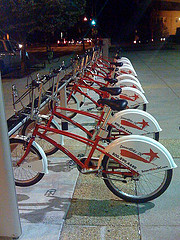For all the Northwest cities looking to launch successful bike-share programs, one of the country’s largest bike-share systems (Washington DC) just released a trove of data about how people have been using the program.
The good news? Residents who joined the bike-share program saved an average of $819 a year on transportation costs, 80 percent said they now bicycled more frequently, and organizers estimated that the bike-sharing program saved its members from driving 5 million vehicle miles.
The bad news? The 18,000 members who signed up for the bike-sharing program don’t exactly reflect the region’s population at large. Compared to the area’s average commuter, they were considerably younger and more likely to be male, white, highly educated and slightly less affluent. The bike-share users were also more likely to be employed than the general population.
Here in the Northwest, our major cities may be late to the bike-sharing movement, but some are moving forward at long last. Just last week, Vancouver BC approved a plan to launch a bike-share program by next spring. Interestingly, the city appears to be trying to figure out a way to integrate helmets into the rental program to comply with the province’s mandatory helmet laws (although momentum may be building to change the law). As we’ve written before here at Sightline, whether you love ’em or hate ’em, adult helmet laws can be one of the biggest roadblocks to successful public bike-sharing systems. (King County, WA also has a mandatory helmet law for adults, which could put a damper on the success of the bike-sharing system that some are working to design and launch.)
Portland, which does not have an adult helmet law, has also decided to move forward with a bike-sharing program in 2013 that would allow users to rent and return bikes at fixed kiosks around the city for a fee. The city has already learned some lessons from other bike-sharing programs around the world: big systems work better than small ones, bike sharing works best in dense places, stations need to be close together, and theft and vandalism aren’t major problems, contrary to what people imagine. So what can our fledgling efforts learn from DC, which has one of the largest bike-sharing programs in the US and one of the few that’s been in operation for more than a year?
Capital Bikeshare recently conducted the first survey of its members to find out how they’re using the system. The program offers short-term rentals of 1500 bicycles from 165 stations across Washington DC and Arlington County, VA. After registering for membership, users receive a key that allows them to unlock a bike at any station and return it to another station in the network.
Here are some interesting data points from that survey:
- 40 percent of members drove a car less often after joining the bike-share program
- Members also made significant reductions in walking (31 percent), bus (39 percent) and rail (47 percent) trips
- More than a third (36 percent) said they bicycled much more often and 46 percent said they bicycled more often
- About a quarter of employed respondents started driving alone to work less frequently since joining bikeshare
- More than half of recent bike-share trips were for non-work purposes (56 percent had used it to go to a restaurant, 40 percent to shop, 36 percent for exercise and recreation)
- 60 percent of respondents had used bike sharing to get to or from work, and 31 percent had used it to get to a meeting
- Bike share survey respondents were twice as likely to report that their employers offered bike racks, showers, personal lockers, and other bicycle-support services as other commuters
- Members who used the bike-share program most frequently reported the greatest reductions in other modes of transportation
- Members reported saving $15.75 a week on transportation costs by using the bike-share program
- 85 percent of respondents said they were motivated to join the bike-share program to get around more easily or more quickly
- 66 percent said they liked to bike or thought biking was a fun way to travel
- 46 percent cited a desire to save money on transportation
- 72 percent of respondents had used a smart phone app called SpotCycle, allowing them to locate bike-sharing stations in the area and see if a bike is available there
The most surprising thing to me was the degree to which bike-share users looked, well, very much like bike commuters in general (youngish, male, white). I had imagined that the availability of easily accessible bikes all over the city would prompt more people like me (not-youngish-anymore, female, white) to grab a bike to run errands or get to a meeting. But perhaps the mere availability of a bike nearby doesn’t trump the raft of reasons that women bike less often than men.
It makes sense to me that the cost to join the program ($7 a day, $75 a year, plus a per-trip fee) would be high enough to rule out a lot of use by very low-income residents but still appeal to a less affluent population that doesn’t find air-conditioned car trips essential. As Northwest cities move forward in designing their own systems, I hope they can find a way to make their bike-sharing systems work better for all residents, not just the ones already predisposed to hop on a bike.


Comments are closed.